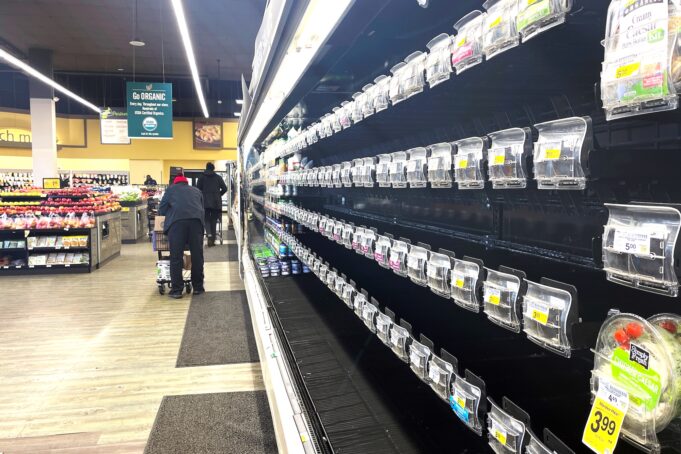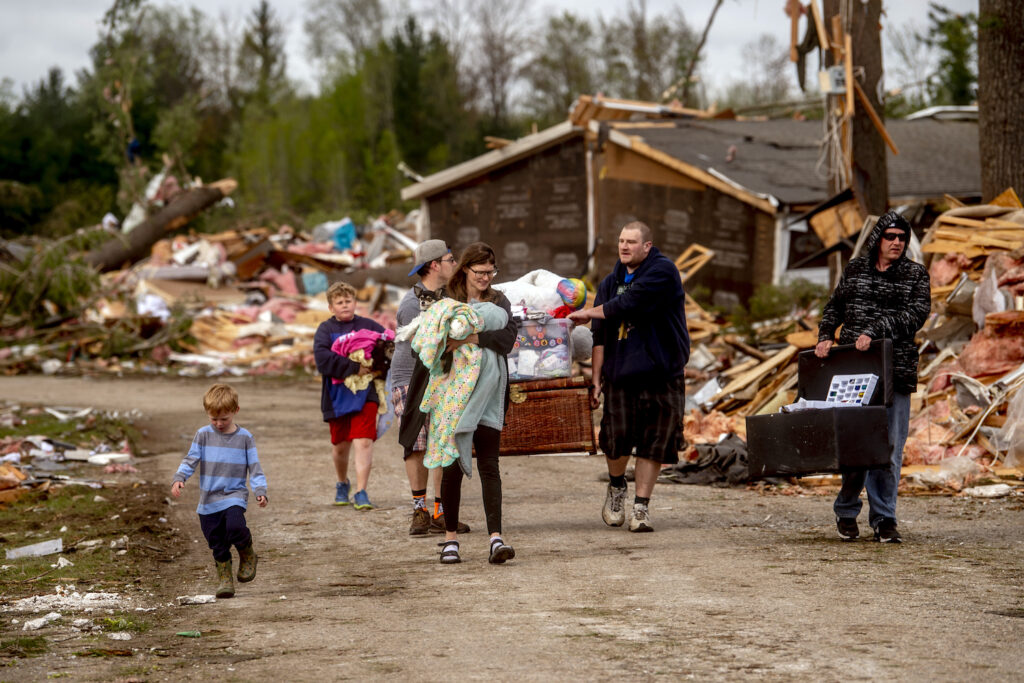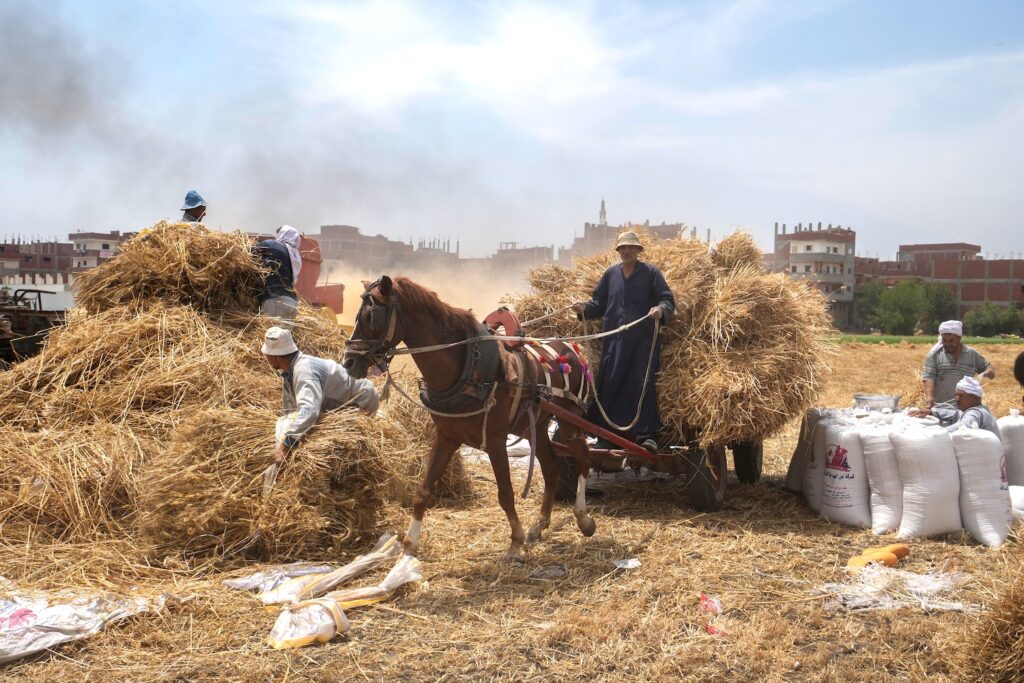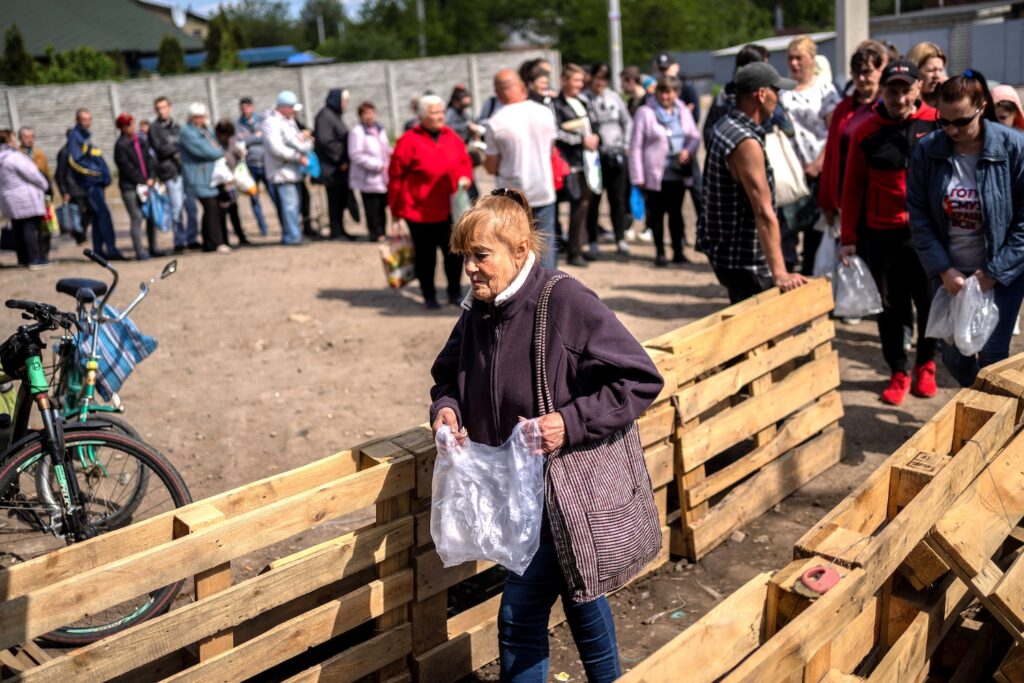War, conflict is fueling famine abroad, fear at home
By Brian E. Muhammad, Staff Writer- May 31, 2022

“O people, keep your duty to your Lord; surely the Shock of the Hour is a grievous thing.
—Holy Qur’an 22:1
Global food shortages are causing panic and concern as a grim reality is setting in for the United States. The impact of shortages of grain, wheat and other critical food supplies resulting from the Russia-Ukraine war is still raging and growing more dire day by day.
Global trade held up in the war-ravaged area is dangerously compounding existing economic troubles enveloping Europe and food security issues in Africa, the Middle East and Asia. No corner of the Earth is seemingly spared, including America, the top worldwide economic power.
 ›
›Many countries, including some of the world’s poorest, count on Russia and Ukraine—which combined, accounts for nearly one-third of the global wheat supply—for more than half of their wheat imports.
Russian forces have effectively tied up trade traffic in the Black Sea, the key waterway of shipping Ukrainian grain and goods to world markets. Regions from Europe to Africa, the Middle East as well as America have been adversely impacted. The war and Western sanctions on Russia have sent the cost of grain, cooking oil, fertilizer, and energy surging. America and western nations say Russia is to blame for invading its neighbor. Ukrainian President Volodymyr Zelenskyy is calling on western powers to impose more sanctions on Russia calling the sea blockade a “new threat to everyone on our continent.”
“It’s impossible, utterly unrealistic in the modern world” to isolate Russia, said Russian President Vladimir Putin, virtually addressing members of the Eurasian Economic Forum. Those who try would “primarily hurt themselves,” he said referring to the food supply chain crunch.

Gaylord resident Stephanie Kerwin, center, holds her baby Octavius in one arm and dog Pixie in the other as she and her family carry what they could salvage from her home n Nottingham Forest Mobile Home Park, seen here on Saturday morning, May 21, 2022 in Gaylord. At least two people died, both in their 70s, after a tornado touched down in Nottingham Forest Mobile Home Park. An additional 44 injured after the May 20 natural disaster according to Michigan State Police. “This morning is when it first hit me — I could have lost people that I really love. I am so grateful,” she said. (Jake May | MLive.com)
Moscow urged the West on May 27 to lift debilitating wide ranged sanctions placed on Russia over the war in Ukraine. Moscow “is ready to make a significant contribution to overcoming the food crisis through the export of grain and fertilizer on the condition that politically motivated restrictions imposed by the West are lifted,” said a Kremlin readout of a call between Mr. Putin and Italian Prime Minister Mario Draghi.
A growing international food crisis has been worsened by Ukraine’s inability to ship millions of tons of grain and other agricultural products during the war.
Meanwhile the Russian Defense Ministry said on May 25 that it had finished demining the port of Mariupol in Southeastern Ukraine where tense fighting took place in recent weeks.
Defense officials said foreign ships stuck there will be able to leave, reported Radio Free Europe-Radio Liberty. Ministry spokesman Igor Konashenkov told a press briefing that the port had started “to function normally.”
However, Western nations and America are scrambling to mitigate the precarious position Russian control of the Black Sea ports has placed them in. Despite the massive American led economic sanctions and political isolation heaped on Russia, the reverberation has been global food insecurity and intensified war.
More than 22 million tons of grain are stuck in silos and zero room to store Ukraine’s harvest.
“And while there will be a food crisis unfolding in some parts of the world, Ukrainian grain will be getting rotten under open skies,” said Dmytro Kuleba, Ukraine’s Foreign Minister on May 25.
“If this problem is not resolved, Ukrainian farmers will not plant another crop and the whole agricultural cycle in Ukraine will be interrupted, and that will mean a multi-year food crisis,” he said.
European Commission head Ursula von der Leyen called for talks with Moscow about unblocking wheat exports trapped in Ukraine.
“Russian warships in the Black Sea are blockading Ukrainian ships full of wheat and sunflower seeds,” Ms. von der Leyen told the World Economic Forum in Davos, Switzerland, on May 24.
The EU chief argues Russia is weaponizing food supplies with global repercussions, like it employed in the energy sector.
Fighting has already placed indirect pressure on global grain prices. While the threat of Russia’s naval blockade continues to deter access by commercial shipping to Ukrainian ports, the resulting supply shortfalls will further increase the price of many staple products worldwide.
Russia-Ukraine conflict compounding problem
Moscow urged the West on May 27 to lift debilitating wide ranged sanctions placed on Russia over the war in Ukraine. Moscow “is ready to make a significant contribution to overcoming the food crisis through the export of grain and fertilizer on the condition that politically motivated restrictions imposed by the West are lifted,” said a Kremlin readout of a call between Mr. Putin and Italian Prime Minister Mario Draghi.
A growing international food crisis has been worsened by Ukraine’s inability to ship millions of tons of grain and other agricultural products during the war.
Meanwhile the Russian Defense Ministry said on May 25 that it had finished demining the port of Mariupol in Southeastern Ukraine where tense fighting took place in recent weeks.
Defense officials said foreign ships stuck there will be able to leave, reported Radio Free Europe-Radio Liberty. Ministry spokesman Igor Konashenkov told a press briefing that the port had started “to function normally.”
However, Western nations and America are scrambling to mitigate the precarious position Russian control of the Black Sea ports has placed them in. Despite the massive American led economic sanctions and political isolation heaped on Russia, the reverberation has been global food insecurity and intensified war.
More than 22 million tons of grain are stuck in silos and zero room to store Ukraine’s harvest.
“And while there will be a food crisis unfolding in some parts of the world, Ukrainian grain will be getting rotten under open skies,” said Dmytro Kuleba, Ukraine’s Foreign Minister on May 25.
“If this problem is not resolved, Ukrainian farmers will not plant another crop and the whole agricultural cycle in Ukraine will be interrupted, and that will mean a multi-year food crisis,” he said.
European Commission head Ursula von der Leyen called for talks with Moscow about unblocking wheat exports trapped in Ukraine.
“Russian warships in the Black Sea are blockading Ukrainian ships full of wheat and sunflower seeds,” Ms. von der Leyen told the World Economic Forum in Davos, Switzerland, on May 24.
The EU chief argues Russia is weaponizing food supplies with global repercussions, like it employed in the energy sector.
Fighting has already placed indirect pressure on global grain prices. While the threat of Russia’s naval blockade continues to deter access by commercial shipping to Ukrainian ports, the resulting supply shortfalls will further increase the price of many staple products worldwide.
Russia-Ukraine conflict compounding problem

United Nations Secretary General Antonio Guterres has urged Russian authorities to unstop the shipping ports to avert global food shortages. He warned the world hunger crisis would worsen for years to come if the state of affairs compounded by the Russia-Ukraine war is not reversed soon.
The UN head said he has had intense contact on the issue with Russia, Ukraine, Turkey, America, the European Union and several other key countries. He said it will take goodwill on all sides to reach a package deal and pull through the crisis. Mr. Guterres would not publicly elaborate on the details of such an agreement, saying it could undermine the chances of success.
Food insecurity and U.S. policy
This is a time of reaping what has been sown at home and abroad warned the Most Honorable Elijah Muhammad, the Eternal Leader of the Nation of Islam, and His student the Honorable Minister Louis Farrakhan. Both men have warned, what is being witnessed overseas will touch the shores of America.
Pestilence and calamities are engulfing the world and have targeted America in particular with the worst yet to come.
The scriptures states that the shock of the hour is a grievous thing. It’s the consequence of ignoring right guidance after repeated warnings from prophets, messengers, and warners about impending doom for refusing to answer the call to repentance and justice for a history of exploitation, oppression and slavery.
The downfall is clear. America has been in the throes of adverse weather events, loss of global friendship, and diminished stature as the world’s most influential power. Since the bloody conflict between Russia and Ukraine started earlier this year involving America and European nations, some of America’s own vulnerabilities are being exposed, including the looming threat of hunger and food insecurity.
America was in trouble well before February 2022 when war broke out in Eastern Europe between two of the world’s main breadbaskets and suppliers of material needed for agriculture. At the same time, negative effects on supply chains and food shortages driven by the Covid-19 pestilence drove many Americans to food banks. According to Feed America, a national food bank organization, in the wake of the pandemic, unemployment and food insecurity soared. In 2020, over 60 million people turned to food banks and community programs for help putting food on the table.
Two years later, along with the domino effect of war, the world still mitigates the economic destruction of the pandemic. America, which touts itself as the land of the free and home of opportunity, continues waning to a place where people must make trade-offs. Do they buy food for their children or pay for utilities, rent, and medicine?
Today out of 332.2 million people, 38 million face hunger in the U.S.—including more than 12 million children, according to the United States Department of Agriculture. Hunger knows no boundaries—it touches every community in the U.S.
A fact sheet by “Feed America,” a national food bank, said many households experiencing food insecurity do not qualify for federal nutrition programs and visit local food banks and other food programs for extra support.
Hunger in Black, Latino, and Native American communities is higher because of systemic racial injustice. To achieve a hunger-free America, we must address the root causes of hunger and structural and systemic inequities, said Feed America.
In America, COVID-19 presented a particular shock of the hour that compounded food insecurity replete with reduced incomes and disrupted supply chains.
“I think one of the things that was noticed the most is just the need for food greatly rose, just in communities, and people were losing their jobs,” said Tony Cartegena, public relations and communications coordinator at Feeding America-Eastern Wisconsin. “When you’re budgeting, you have to account for certain things and food is one of those things that is kind of nonnegotiable,” added Mr. Cartegena.
The food bank is Wisconsin’s largest and serves 35 counties, and supplies food to over 400 food pantries statewide.
Mr. Cartegena told The Final Call that food banks nationwide probably found that more people were attending food distribution and food pantries to receive groceries for the week. “There was definitely an increase in the number of people that needed assistance,” he observed. “We also see that, in the amount of just pounds of food that we had to order during the pandemic.”
But on the other side of the scenario was the increase in generosity of the community. The high demand of the food bank services was met because members of the community stepped up to donate their time, disposable income or donate food to help make ends meet for others, said Mr. Cartegena.
However, on other levels America continues to show signs of trouble. Tumultuous events on the world stage are occurring at a time America is facing negative impacts on food production and potential famine and hunger issues.
Everybody is affected, from grain dealers to grain growers down to the consumers. The price of fuel is clocking in at record highs and having a debilitating impact across the board. The increase in fuel prices comes against the backdrop of rising world oil prices. American industry leaders said U.S. policy changes are needed.
“High fuel prices are really increasing the cost of shipping,” said Stu Letcher, executive vice president of North Dakota Grain dealers Association. Fuel surcharges are taxed on North Dakota grain shipped to market by railway that is increasing the cost of shipping. “So that’s one thing that’s having a big effect on, probably agriculture in North Dakota as a whole,” Mr. Letcher told The Final Call.
From Mr. Letcher’s standpoint, the government can do more to address the problem of fuel price increases. He advocates opening up the oil reserves within America to offset the crisis.
“It’s policy, I mean, change the policy. Open it up … you’ll see fuel prices drop overnight,” said Mr. Letcher.
Behind Texas, North Dakota is the number two oil producer in America. There shouldn’t be an energy shortage because there are hundreds of years of oil reserves in the ground, he added.
Before the war America imported $1.28 Billion in Russian fertilizers during 2021, according to the United Nations COMTRADE database on international trade.
Everything revolves around petroleum fertilizers and now chemicals cost are higher for the farmer in the field. Farmers are seeing increased input cost, said Mr. Letcher.
Fuel for freight is one of the main pieces of cost moving products to market.
Freight is going through the roof because of fuel. Drop the price of fuel, you dropped the price of freight. You dropped the price on a lot of the inputs. “It’s not rocket science,” said Mr. Letcher.
Drought and looming effects of hunger
Earlier this year President Joe Biden cautioned a food shortage was coming as a result of the Russia-Ukraine war and the sanctions imposed by the West. At the time he said warnings about fertilizer and wheat scarcity were real.
“We did talk about food shortages. It’s going to be real. The price of these sanctions is not just imposed upon Russia. It’s imposed upon an awful lot of countries as well including European countries and our country as well,” Mr. Biden said.
In addition to the global impact on America is the adverse weather patterns gripping the country. More than half of Kansas, a major U.S. wheat growing state, was classified under severe drought or worse as of March 8, the driest conditions since 2018, according to the National Drought Mitigation Center.
Severe drought is also covering three-quarters of Oklahoma and more than two-thirds of Texas, both of which also are large wheat producers, said Reuters.
Major grain producers like the United States, Canada, France, Australia and Argentina are being closely watched to see if they can quickly ramp up production to fill in the gaps from lost Ukrainian and Russian supplies, said Associated Press. But farmers are facing the prospect of another year of drought, climbing fuel and fertilizer costs, and supply chain disruptions from the Covid-19 pandemic. Major producers also are hamstrung by factors like legal limits on exports and farming patterns.
The Honorable Elijah Muhammad warned that the calamities such as adverse weather conditions and famine entering America is Divine chastisement for wickedness and debauchery inside America and abroad. He compared the fall of America with the fall of Ancient Babylon, a scriptural city destroyed for its transgressions.
In early writings, Elijah Muhammad said America, like Babylon was rich, proud and her riches increased her corruption. She had every merchandise that the nations wanted or demanded; her ships carried her merchandise to the ports of every nation. She was a drunkard, filled with adultery and murder. Babylon persecuted and killed the people of God and His saints and prophets. Hate and filthiness, gambling and sports of every evil, as you practice in America were practiced in Babylon. Only America is modern and much worse.

“This people have gone to the limit in doing evil; as God dealt with ancient people—so will He deal with the modern Babylon (America),” said Elijah Muhammad.
“As God says: ‘Son of Man, when the land (people) sinneth against Me by trespassing grievously then will I stretch out mine hand upon it, and will break the staff of bread thereof, and will send famine upon it, and will cut off man and beast from it.’ (Ezekiel 14:13).
Min. Farrakhan echoed his teacher’s warning that famine is imminent and the best and only solution for Black people is separation and doing for self, although many are not desirous to do so.
“But here is something to consider; for ‘the state of mind’ of our Black Leadership class is this: They cannot see themselves in any way being separated from their former slave masters and their children. They can’t see it; they don’t want to see it! And really, most don’t want it,” Minister Farrakhan said during an installation of his 2013 lecture series, “The Time and What Must be Done.”
Minster Farrakhan explained as long as Black leaders press Whites and government for all their needs rather than redirect their creative talent and capability shown in every field of human endeavor for self, White anger and race driven blood shedding will increase.
“And soon, you will see that it is The Time in History that we must be separated,” said Minister Farrakhan.
No comments:
Post a Comment